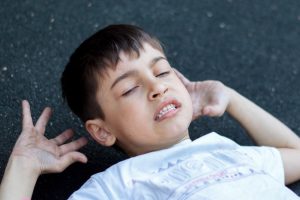
By justoomm at Shutterstock
Like adults, concussions in children are a type of Traumatic Brain Injury (TBI). This type of injury can produce a multitude of mental and physical effects that range from mild to severe. More often than not, children receive a concussion when they suffer a blow to the head as a direct result of a fall, sports injury, whiplash, car crash, or other traumatic event.
Suffering a Concussion as a Child
Children can receive concussions from hard hits to their body, face, neck, or head. The result of the hard hit can be a rapid acceleration of the brain, which causes the concussion. The most common causes of concussions in children are sports injuries, car accidents, falls, and being hit by another object or person. The good news is that many concussions in children can be prevented by taking the right steps. Through research and support groups, parents can avoid common concussion myths that could unintentionally harm their children. For example, it is a common misconception that a helmet will prevent a concussion. Instead, the helmet is designed to prevent catastrophic brain injuries. With this in mind, if a child is wearing a helmet, but still suffers a hard hit to the neck, body, or head, then he or she could still suffer a concussion.
Children can help prevent concussions by wearing their seatbelt any time they are in a car or bus. They can also use mouth guards to prevent facial trauma and possibly reduce the risk of a concussion during sporting events. Child athletes can complete neck-strengthening exercises to help reduce the impact of sports concussions. Finally, parents should carefully monitor their children after a suspected concussion. Through time and rest, children can heal. However, if a child returns to high impact situations or rigorous exercises too early, then they can worsen their symptoms and increase their risk for a second concussion.
What Are the Common Symptoms of a Concussion?
Concussion symptoms will vary based on the child, as well as the level of the TBI. The most common concussion symptoms include:
- A slow response time after injury to the head, neck, or body
- Consistent and pounding headache
- Changes in normal sleeping or eating habits
- Dizziness and increased fatigue
- Trouble concentrating, paying attention, or remembering
- In extreme cases, excessive vomiting, slurred speech, convulsions, loss of consciousness for more than one minute, and problems with balance or coordination
If your child is experiencing any of the above symptoms, contact their doctor or visit your local emergency room immediately.
Get the Support Your Child Needs After a Traumatic Brain Injury
Regardless of their severity, concussions in children can be a traumatic experience. The good news is that TryMunity is here to help with a supportive social community. Our members are ready to answer your questions, offer guidance on the best prevention methods, and support you and your child after a concussion. To learn more about how TryMunity can support your child’s journey to recovery, visit our frequently asked questions or join at community.trymunity.com.



